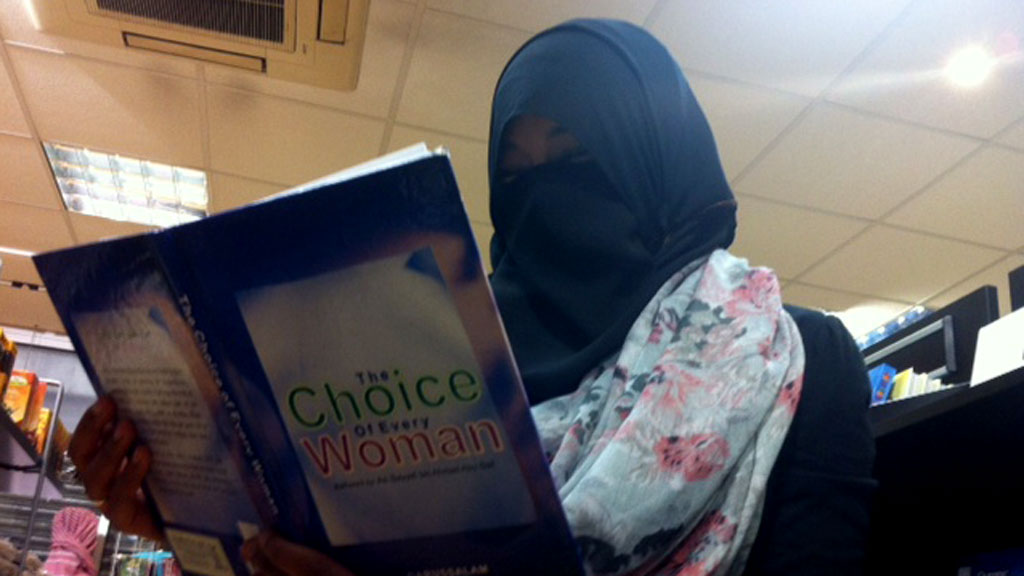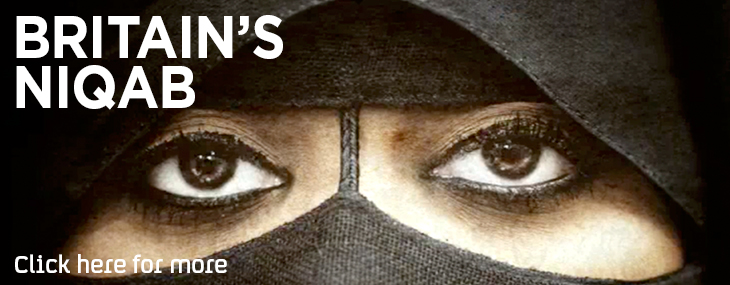Why Muslim women choose to wear the veil
 Darshna Soni
Communities Editor
Darshna Soni
Communities Editor
They are accused of threatening the British way of life, provoking a debate about integration. Why are an increasing number of young Muslim women covering their faces? Darshna Soni investigates.
Birmingham’s Coventry Road in Small Heath is a bright, bustling, shopping street. It’s home to the city’s largest Muslim community, an area where you can buy everything from samosas to salwar kameez.
Hurrying past the colourful displays in the shop windows, trying to keep out of the rain, we met dozens of women going about their day completely shrouded in black. They are hidden behind baggy gowns and scarfs that cover their entire faces, apart from a tiny slit for their eyes.
The niqab is so common here that hardly anyone gives them a second glance. So why are more and more young women wearing it?
It’s often assumed that girls who wear the niqab are forced into it by their families. But is that really true? I met Asma, who was just 13 when she started covering her face.
‘Completely shocked’
“My family were completely shocked. My mum especially. They couldn’t believe I wanted to start veiling.”
Asma’s mother doesn’t wear the niqab. In fact, nobody in her family does. She told me that she hadn’t even understood the reasons why the niqab was worn. “I went to an all-girls’ school, with all women teachers, so I didn’t even need to wear it at that time.”
So why did she? “I had seen my friend at the local mosque wearing it. It was something new, something different. Young girls want to find a way of expressing themselves. It’s almost like a teenage rebellion.”
Asma says she has since studied her religion’s teachings on the veil and decided to continue with it. “It gives me a peace, a spiritual peace.”
There are no official numbers on women who wear the niqab. The majority of British Muslims hail from South Asia, where the veil isn’t commonly worn.
Muslim identity
But we found that many young girls, like Asma, are adopting the niqab, even though their mothers never did, partly as a way of asserting a Muslim identity they feel is under attack.
Young girls want to find a way of expressing themselves. It’s almost like a teenage rebellion. Asma
“We’re fed up of everyone in the media going on and on about Muslims. Surely as a country, we’ve got much bigger problems to worry about?”
Zena has just finished university and told me many students, living away from home are exploring the politics of their religion.
She also suggested it’s about rejecting western ideals of beauty. “Surely it’s better not to wear skimpy clothes, to preserve some of your modesty? I’m not sure what all the fuss is about. I would feel more uncomfortable seeing someone walking down the street in skimpy clothes, with no shame, than someone covering up with extra clothes.”

Her friend Seema agreed. “Look at what happened recently with Miley Cyrus. She went from Hannah Montana to twerking. Is that the kind of role models we want for our daughters? Or do we want them to cover up?”
Some women I spoke to said they felt empowered when they put on their niqab. They didn’t want to dress the way magazines tell them to. But for many non-Muslims (and some Muslims), the idea that women should hide themselves away under a face covering doesn’t sit easily with notions of gender equality.
Look at what happened recently with Miley Cyrus. She went from Hannah Montana to twerking. Is that the kind of role models we want for our daughters? Or do we want them to cover up? Seema
The niqab has come to represent a wider debate about the question of integration and British values. In a recent case, a judge questioned whether the niqab is compatible with the principles of open justice, after a defendant refused to remove it in his courtroom. In the end, a compromise was reached. The woman will be allowed to wear it during the trial, but not when she gives evidence.
‘Extremist’
“People don’t understand the niqab, and so they think everybody who wears it is an extremist. They think it’s not compulsory in Islam and so can’t understand why we would chose to wear it.”
Mirina Paananen is studying to become an Islamic scholar – one of the few women in this area. She’s a Cambridge graduate and a white, Christian convert.
Many female converts wear the veil, as a way of visualy identifying with their adopted community. “For me, it is a part of Islam. People say raise the issue of equality, but we have to accept there are differences between men and women. There’s nothing wrong with that.”
But are women commanded to wear it? Within Islam itself there is fierce debate, as Marina admitted. There are just two, arguably ambiguous, references in the Koran dealing specifically with women’s dress and this has led to different interpretations.
But some mosques of the Salafi and Wahabi tradition insist it is necessary. We found some concern that young girls are being made to feel that it’s a religious duty to hide their faces.
“Assumptions are made about you if you don’t cover up,” one woman wearing a hijab told me. “People judge your level of piety.”

This was reflected on the shelves of the Islamic bookstores on Coventry Road, where we found many different publications dealing with the issue of a woman’s modesty.
Some outlined the religious justification for the niqab and explored the arguments both for and against. But others took a more hardline stance, including one entitled “Women Who Deserve To Go To Hell”, which in its introduction states: “We have no intention to accuse women when we say that they will be in a majority in hell.”
Asma told me: “It should be a woman’s choice at the end of the day.” She is now contacted by other young girls who are thinking of adopting the niqab and who see her as a role model.
‘Think very carefully’
I asked her what she advises them. “I always say think very carefully. It’s a big decision to go out with your face covered, it takes a lot of courage. But once you do wear it, the rewards are huge.”
Ironically, scholars say that face veiling was practised by many cultures before Islam – and that Muslims adopted it as a way of fitting into these societies.
Today, they are accused of the very opposite. And yet many of the young women we met say they are, in their own ways, still simply trying to fit in, of finding a way of expressing the very British freedoms they are accused of undermining.
